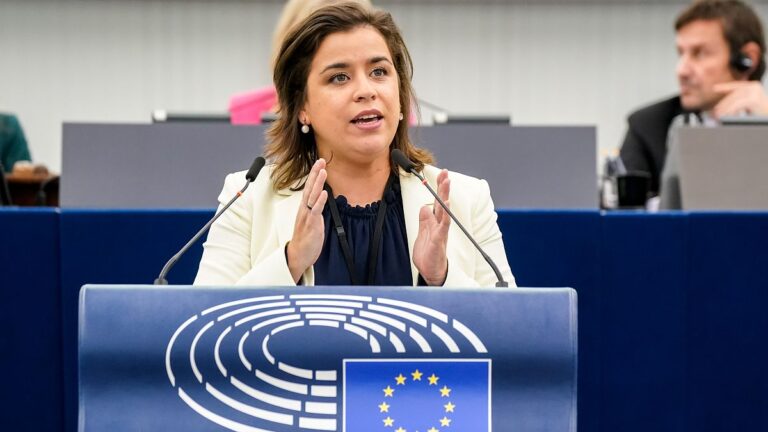The European Parliament has called for a European strategy on mental health in its first such resolution. Euronews discussed the societal “paradigm shift” required on this issue with the lead lawmaker on the issue.
“If I told someone I had depression, they wouldn’t have the same reaction as if I told them I had a physical illness. This report aims to change this mentality,” said MEP Sara Cerdas (Portugal/Socialists & Democrats) in an interview with Euronews.
Putting mental health on an equal footing with physical fitness and tackling the stigma of those who suffer from related illnesses are at the heart of the non-binding resolution approved by the plenary of the European Parliament in Strasbourg this week (December 12) by an overwhelming majority, with 482 MEPs in favor, 94 against and 32 abstentions.
“If you have pneumonia, people check on you every day: they bring you soup, medicine and everything you need to get through your illness,” she continued, adding: “When This is about mental health, it’s not.”
Cerdas, who guided the file through the legislature as rapporteur, hopes it will lay a “solid foundation” on Parliament’s expectations of the European Commission and member states.
The EU executive estimated that mental health problems affected around 84 million EU citizens in 2018. The pandemic has made the situation worse: almost one in two EU citizens experienced emotional or psychosocial problems last year, while the number of people affected by loneliness doubled compared to before. -years of pandemic.
Last June, the Commission presented a holistic approach to mental health introducing 20 new initiatives and earmarking €1.23 billion in new funding for prevention and improving access to high-quality, affordable mental health care and treatment.
In the approved resolution, MEPs welcomed the communication as an important review of all the initiatives taken by the European executive in the field of mental health.
“But we need more. We need a clear strategy to clearly define the EU’s path forward on mental health,” added Cerdas.
Such a strategy should include defining guiding indicators to measure the current situation as well as well-defined targets such as reducing suicide in Europe by 30% by 2030, according to Cerdas.
In Europe, suicide is the second leading cause of death among young people aged 15 to 19 after road accidents.
“It’s okay to cry, it’s okay to not be okay”
With their report, lawmakers hope to promote a paradigm shift in societal awareness of mental health.
“I come from Portugal where, just a few decades ago, it was not acceptable for a man to cry or deal with his mental health,” Cerdas said.
MEPs are specifically interested in the awareness campaigns organized each year by the Commission around a given theme and want 2025 to be proclaimed the European Year of Mental Health.
Such a campaign – supported by EU ministers in an opinion on mental health at the end of November – would not only raise public awareness on the subject, but would also secure specific initiatives and additional funding, according to Cerdas.
In terms of financial support, the report also suggests creating a specific mission on mental health under the current Horizon Europe and the future EU research program which will run from 2028 to 2035.
In a statement after the vote, EU advocacy group Mental Health Europe called for more investment in implementing the structural and systemic changes called for by MEPs.
For Cerdas, it is time that research no longer focuses solely on the scientific and biological aspects of mental health and moves towards a better understanding of its societal impact.
“It’s important to separate (mental health) from just brain health, understanding that it’s also an individual and societal issue,” she said.
The approved report identifies vulnerable groups such as young people, women, migrants, the LGBTQIA+ community, older people and ethnic minorities as prime targets for actions to improve access to mental health services and reduce social exclusion.
“What we wanted to emphasize is that at any time in life you can be more vulnerable than usual,” she concluded.
